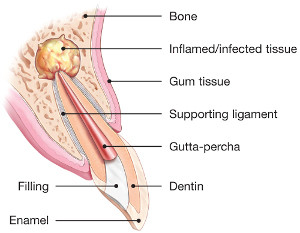All About Endodontic Surgery
Occasionally, a nonsurgical root canal procedure alone cannot save your tooth and your endodontist will recommend surgery.
Surgery can help save your tooth in a variety of situations.
- Surgery may be used in diagnosis. If you have persistent symptoms but no problems appear on your x-ray, your tooth may have a tiny fracture or canal that could not be detected during nonsurgical treatment. In such a case, surgery allows your endodontist to examine the entire root of your tooth, find the problem, and provide treatment.
- Sometimes calcium deposits make a canal too narrow for the instruments used in nonsurgical root canal treatment to reach the end of the root. If your tooth has this “calcification,” your endodontist may perform endodontic surgery to clean and seal the remainder of the canal.
- Usually, a tooth that has undergone a root canal can last the rest of your life and never need further endodontic treatment. However, in a few cases, a tooth may not heal or become infected. A tooth may become painful or diseased months or even years after successful treatment. If this is true for you, surgery may help save your tooth.
- Surgery may also be performed to treat damaged root surfaces or surrounding bone.
- Although there are many surgical procedures that can be performed to save a tooth, the most common is called apicoectomy or root-end resection. When inflammation or infection persists in the bony area around the end of your tooth after a root canal procedure, your endodontist may have to perform an apicoectomy.

In this procedure, the endodontist opens the gum tissue near the tooth to see the underlying bone and to remove any inflamed or infected tissue. The very end of the root is also removed.
A small filling may be placed in the root to seal the end of the root canal, and a few stitches or sutures are placed in the gingiva to help the tissue heal properly.
Over a period of months, the bone heals around the end of the root.
Often, the only alternative to surgery is the extraction of the tooth. The extracted tooth must then be replaced with an implant, bridge, or removable partial denture to restore chewing function and to prevent adjacent teeth from shifting. Because these alternatives require surgery or dental procedures on adjacent healthy teeth, endodontic surgery is usually the most biologic and cost-effective option for maintaining your oral health.
No matter how effective modern artificial tooth replacements are—and they can be very effective—nothing is as good as a natural tooth. You’ve already made an investment in saving your tooth. The payoff for choosing endodontic surgery could be a healthy, functioning natural tooth for the rest of your life.
